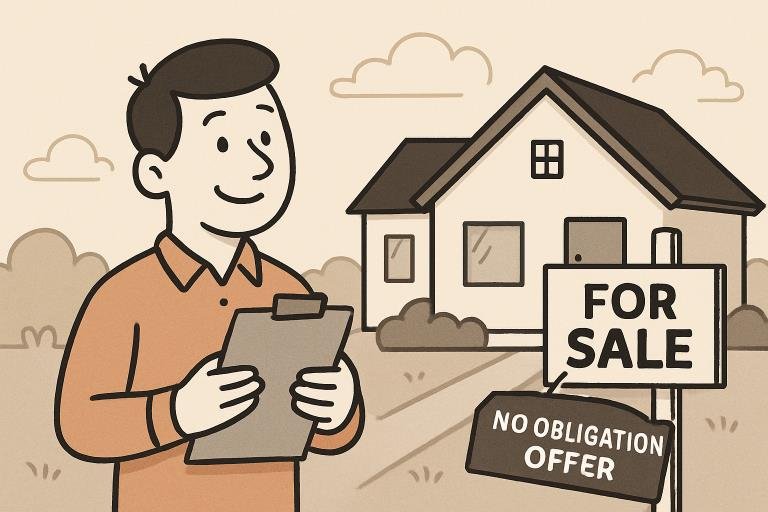Key Takeaways
- No-obligation offers let you review bids without commitment.
- Often, cash buyers purchase “as-is.”
- Prepare with a property review, documents, and market research.
- Compare terms carefully and seek expert advice.
- You can walk away anytime before signing.
What Is a No-Obligation Home Offer?
Selling your property can be a major decision, but receiving a no-obligation offer lets you explore your options completely. A no-obligation home offer means you are under no pressure or requirement to accept a bid, giving you maximum flexibility and control over your Home Sale. In today’s competitive real estate environment, these offers are increasingly common and provide homeowners a valuable opportunity to consider their next move without commitment. If you’re seeking a straightforward, convenient process for your home sale, understanding how to prepare for these offers is essential.
Typically, these offers are extended by cash buyers, investors, or companies specializing in fast home buying. The crucial advantage is the ability to review and reflect on an offer without obligation—eliminating stress and giving you the time needed to make the right decision. However, it’s important to ensure offers come from reputable sources and to understand every aspect of the proposal.
Assessing the Current Condition of Your Home
Before you start accepting or even requesting offers, meticulously review the present state of your property. Walk through every room, observing everything from minor cosmetic issues to potential structural problems. Make a list detailing needed repairs, updates, or maintenance tasks—this will clarify your home’s strengths and weaknesses and prepare you for any questions buyers may have during negotiations.
Remember that most no-obligation buyers are accustomed to purchasing homes “as-is.” Still, communicating known issues and recent improvements can help set realistic expectations and potentially facilitate a smoother transaction.
Gathering Essential Property Documents
Organization plays a major role in a successful home selling experience. Ensure you collect property documents such as recent tax bills, utility statements, title or deed paperwork, and a record of any home improvements or repairs. Having this paperwork on hand demonstrates transparency and allows potential buyers to move through the due diligence process quickly.
Preparing these documents in advance prevents unnecessary delays and allows you to answer questions confidently. This preparation also reassures buyers that you’re serious and organized—qualities that can increase their comfort and trust in moving forward.
Evaluating Your Home’s Market Value
Accurately gauging your home’s market value is critical to preparing for any offer. Start by researching similar homes in your neighborhood that have recently sold and active listings to assess current demand and market trends. While automated online valuation tools provide a useful starting point, they often cannot account for unique property features, conditions, or location-specific advantages and disadvantages. Aiming for a quick payment can further guide your pricing and negotiation strategy.
Before benchmarking your home’s value, consider factors such as lot size, renovations, proximity to schools and amenities, and overall property condition. A comprehensive understanding empowers you to recognize strong offers and negotiate confidently.
Considering Advice From Real Estate Professionals
Even when contemplating a no-obligation offer, consulting with a real estate agent or legal adviser can provide numerous advantages. These professionals offer deeper insight into the local market, help you avoid common pitfalls, and can often spot red flags or favorable points in an offer that you might overlook. While their guidance isn’t mandatory for every situation, it often leads to more informed decisions.
Look for professionals with experience handling fast sales or investor-driven transactions, as they will understand the nuances involved and offer the most targeted advice.
Comparing Different Home Offers and Protecting Your Interests
Do not rush to accept the first offer you receive. Take your time to review and compare the terms, contingencies, closing timelines, and any requirements for repairs or clean-up. Scrutinize the fine print, paying special attention to any mention of fees, commissions, or unusual clauses. If anything is unclear, never hesitate to ask questions or seek clarification from a professional.
Knowing your bottom line in advance—what you are willing to accept financially and in terms of sale terms—will help protect your interests and empower you to negotiate confidently. Remember, walking away or counter-offering is always an option.
Common Questions About No-Obligation Offers
- Does accepting an offer mean I must sell? A no-obligation offer lets you walk away at any point before a formal sales agreement is signed.
- Do I need to clean up or repair my house?Most no-obligation buyers purchase homes as-is, but a tidy presentation can leave a positive impression and may impact negotiations.
- Will there be any fees or unexpected costs?Review every offer for disclosures about potential fees, closing costs, or commissions. Transparent buyers will outline these clearly—avoid any vague offers about costs.
Moving Forward With Confidence
Receiving a no-obligation home offer opens the door to a variety of choices. Whether you want to move quickly or explore your options, the right preparation ensures you control your next steps. Stay organized, approach each offer with care, and use every resource. With the right knowledge and preparation, you can turn a no-obligation offer into a seamless and successful sale on your terms.



